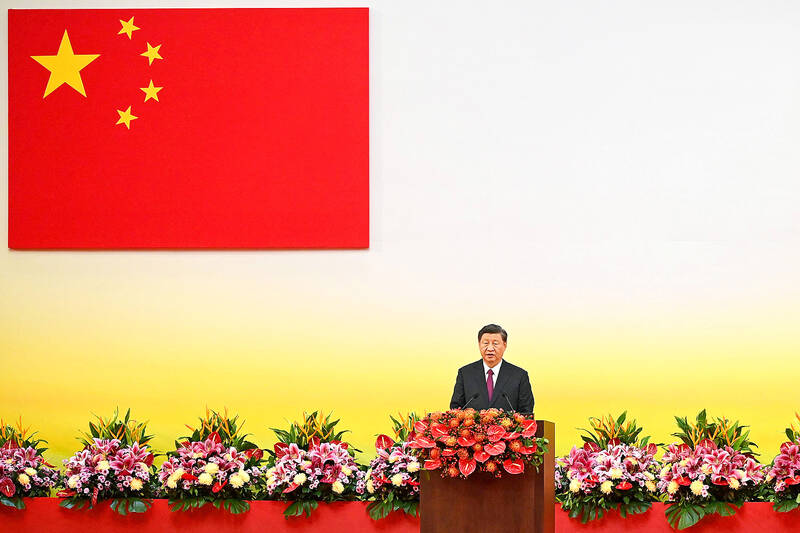China is unlikely to attempt a military invasion of Taiwan in the short term, but would continue pursuing a “salami slicing” strategy with the aim of forcing Taiwan to talk, a research report says.
Chinese President Xi Jinping (習近平) “has a clear intention to unify Taiwan, but the means he would employ to attempt this are vague, and both peaceful unification and the use of military force would remain as possible options,” the report by the Institute for National Defense and Security Research says.
Xi sees China’s unification with Taiwan as being closely linked to his plans for the so-called “great rejuvenation of the Chinese nation,” the report says.

Photo: Reuters
“Xi still sees peaceful unification as the best option to achieve that end, but is also preparing for the worst-case scenario,” it says. “At this stage, the probability of China launching a military attack on Taiwan is low, but if the issue is left to Xi alone to decide, the risk of trouble in the Taiwan Strait goes up.”
The Chinese Communist Party’s (CCP) strategy for pursuing peaceful unification would involve retaining the option of using force, and using threats and coercion to sow a rift in Taiwanese society, forcing Taiwan to the negotiating table, the report says, adding that China would continue attempts to infiltrate Taiwanese society through the guise of various types of exchanges.
Citing examples, the report says China’s large-scale military exercises in the Taiwan Strait held on Sept. 11 last year demonstrated an attempt at intimidation of Taiwanese, while its “cross-strait development plan” promising benefits for Taiwanese who relocate to Fujian Province is an attempt at infiltration and division of Taiwanese society.
At the same time, China’s military drills were intended as a show of force to the US, which it hopes to deter from military involvement in a potential conflict in the Taiwan Strait, the report says.
“Rather than outright launching a war, the CCP is seeking to pressure Taiwan politically, militarily, economically, psychologically and socially,” it says.
However, if decisionmaking power in the CCP is completely concentrated in Xi alone, and CCP bureaucrats lose their advisory functions, the risk of Xi acting rashly in the Taiwan Strait would increase significantly, the report says.
Taiwan’s government and military would need to carefully plan for that contingency, and be prepared for the possibility of an armed conflict with China, it says.

Taiwan has received more than US$70 million in royalties as of the end of last year from developing the F-16V jet as countries worldwide purchase or upgrade to this popular model, government and military officials said on Saturday. Taiwan funded the development of the F-16V jet and ended up the sole investor as other countries withdrew from the program. Now the F-16V is increasingly popular and countries must pay Taiwan a percentage in royalties when they purchase new F-16V aircraft or upgrade older F-16 models. The next five years are expected to be the peak for these royalties, with Taiwan potentially earning

STAY IN YOUR LANE: As the US and Israel attack Iran, the ministry has warned China not to overstep by including Taiwanese citizens in its evacuation orders The Ministry of Foreign Affairs (MOFA) yesterday rebuked a statement by China’s embassy in Israel that it would evacuate Taiwanese holders of Chinese travel documents from Israel amid the latter’s escalating conflict with Iran. Tensions have risen across the Middle East in the wake of US and Israeli airstrikes on Iran beginning Saturday. China subsequently issued an evacuation notice for its citizens. In a news release, the Chinese embassy in Israel said holders of “Taiwan compatriot permits (台胞證)” issued to Taiwanese nationals by Chinese authorities for travel to China — could register for evacuation to Egypt. In Taipei, the ministry yesterday said Taiwan

Taiwan is awaiting official notification from the US regarding the status of the Agreement on Reciprocal Trade (ART) after the US Supreme Court ruled US President Donald Trump's global tariffs unconstitutional. Speaking to reporters before a legislative hearing today, Premier Cho Jung-tai (卓榮泰) said that Taiwan's negotiation team remains focused on ensuring that the bilateral trade deal remains intact despite the legal challenge to Trump's tariff policy. "The US has pledged to notify its trade partners once the subsequent administrative and legal processes are finalized, and that certainly includes Taiwan," Cho said when asked about opposition parties’ doubts that the ART was

If China chose to invade Taiwan tomorrow, it would only have to sever three undersea fiber-optic cable clusters to cause a data blackout, Jason Hsu (許毓仁), a senior fellow at the Hudson Institute and former Chinese Nationalist Party (KMT) legislator, told a US security panel yesterday. In a Taiwan contingency, cable disruption would be one of the earliest preinvasion actions and the signal that escalation had begun, he said, adding that Taiwan’s current cable repair capabilities are insufficient. The US-China Economic and Security Review Commission (USCC) yesterday held a hearing on US-China Competition Under the Sea, with Hsu speaking on